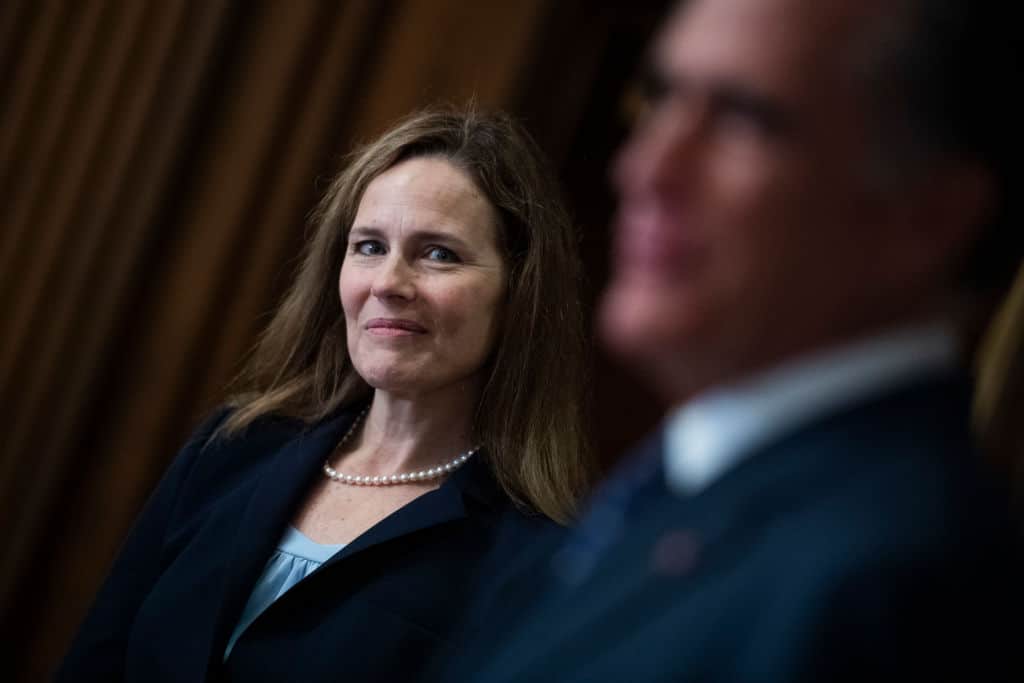 Supreme Court nominee Amy Coney Barrett and Sen. Mitt Romney (R) conduct a photo op in the U.S. Capitol before Coney Barrett met with Senators throughout the day on September 30, 2020 In Washington, DC. (Photo By Tom Williams – Pool/Getty Images)
Supreme Court nominee Amy Coney Barrett and Sen. Mitt Romney (R) conduct a photo op in the U.S. Capitol before Coney Barrett met with Senators throughout the day on September 30, 2020 In Washington, DC. (Photo By Tom Williams – Pool/Getty Images) Who will be more motivated in the closing weeks of a presidential campaign taking place with the backdrop of a historic Supreme Court nomination debate: pro-choice or pro-life voters?
We are about to find out.
The current Supreme Court fight is a prelude to the larger battles for the White House and the Senate majority, which, in turn, are preludes to an even bigger war for the future of legal abortion in this country.
Barring an extraordinarily unexpected turn of events, Amy Coney Barrett will be confirmed as the nation’s next Supreme Court justice. Senate Democrats cannot prevent her confirmation; the only question is how loudly they will protest. But the intended impact of those complaints won’t have anything to do with Barrett herself, but rather, the makeup of the other two branches of our federal government. Depending on how effectively Democrats can mobilize their supporters in the aftermath of what normally would be a dispiriting defeat, Barrett could be sworn in as the court’s newest justice only days before Democratic nominee Joe Biden is elected as the nation’s next president.
Or not.
The presidential election already was going to be determined almost entirely by which of the candidates would be more successful in turning out their party’s respective base. But both the circumstances surrounding Barrett’s nomination and the dramatic ideological shift in the Supreme Court’s makeup that her confirmation will bring have intensified the passions of liberals and conservatives alike. Yet to be determined is which side will use Barrett more effectively as emotional fuel for its most loyal supporters.
Given the enormous stakes represented in this election, it’s notable that Biden and President Donald Trump have faced noticeable challenges in motivating some of their parties’ critical voting blocs. Since the Democratic primary, Trump’s struggles to effectively address the coronavirus pandemic and the nation’s renewed debate over race relations has caused many older voters, suburbanites and other cultural conservatives to drift away. For his part, Biden has failed to excite young people, voters from minority communities and other progressives.
A highly visible debate over Barrett and the high court’s future will remind less-enthused voters on why this election matters so much. In public, Democrats will emphasize the potential overturn of the Affordable Care Act rather than the more volatile topic of abortion rights. Although swing voters are with Democrats on both issues, there are a lot more conservative voters who care more passionately about abortion than they do about health care policy. So, concentrating on Obamacare is less likely to inflame the opposition. However, abortion rights are the issues that motivate Democrats above all others.
A highly visible debate over Barrett and the high court’s future will remind less-enthused voters on why this election matters so much.
A Democratic president and Congress could not remove Barrett from the court, but there are many potentially mitigating steps they could take if they controlled both ends of Pennsylvania Avenue. The idea of increasing the Supreme Court’s membership to outnumber the conservative justices has received considerable attention and is being taken more seriously than at any time since Franklin Roosevelt’s ill-fated court-packing effort of the 1930s.
The idea of adding additional justices is a cathartic one, and if it does inspire additional turnout among angry progressives, then it will have served a useful short-term purpose for Democrats. But the downside to the plan is the payback: If Republicans retain control of the White House and the Senate, at some point in the future, they simply will expand the court.
There are other alternatives. A Democratic Congress could pass legislation to provide legal protection for abortion rights, and a Democratic president could sign that legislation. While a pro-choice law would be vulnerable to being overturned by a future GOP-controlled government, such a move would be a much greater political risk than the same decision being made by the judicial branch.
But neither option can be pursued if Trump is reelected or if Republicans retain control of the Senate. The question is whether Democrats are sufficiently motivated to prevent those outcomes.
Dan Schnur teaches political communications at UC Berkeley, USC and Pepperdine.























 More news and opinions than at a Shabbat dinner, right in your inbox.
More news and opinions than at a Shabbat dinner, right in your inbox.